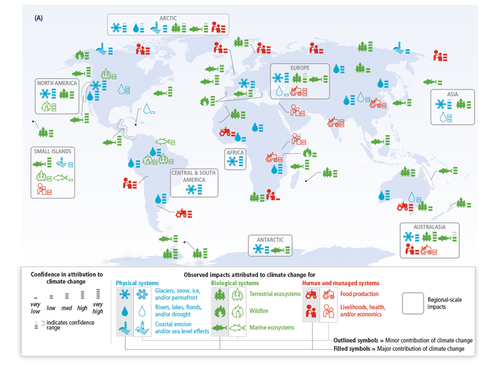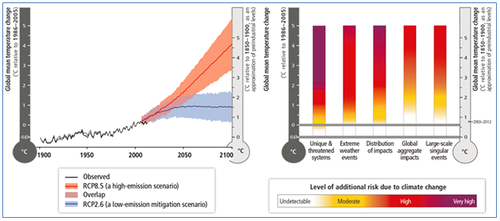The climate science community released its second new consensus report documenting the impacts of climate change in communities around the world, both now and in the future. This report follows on the heels of the earlier report that found that humans are causing global warming and this changing climate is already impacting us. This report is the definitive scientific consensus on the damages of climate change. The findings of this new report are clear: damages from climate change have already been set in motion and major impacts will hit humanity if we fail to act aggressively.
The report – Climate Change 2014: Impacts, Adaptation, and Vulnerability (full report here) — from the Intergovernmental Panel on Climate Change (IPCC) is the second in a series of reports in its fifth round of "Assessment Reports" – often referred to as AR5. More than 300 researchers from 70 countries reviewed more than 12,000 peer-reviewed studies for this report compiled by the IPCC. The report went through extensive scrutiny and has been signed-off by governments around the world.
Here are (at least) three key findings:
Take-Away #1: The impacts of climate change are happening now and are being felt on every continent and in the oceans. The report documents the impacts that are occurring across the world including changes to the quality and quantity of water supplies, negative impacts on agricultural products such as wheat and maize, the location of species, and climate extremes. As you can see from this figure no part of the world has been left untouched.

As the report states:
"In recent decades, changes in climate have caused impacts on natural and human systems on all continents and across the oceans."
Take Away #2: Climate change will have serious impacts on communities, food supplies, economic growth, water supplies, and social stability – no one will be left untouched by a changing climate. Climate change will damage three cornerstones of humanity – water, food, and climate. For example, the report documents that major crops such as wheat, rice, and maize will be impacted in the near-term and even larger reductions in crop yield will appear several decades from now. This decreased yield will lead to higher prices and more food scarcity. The scientists also conclude that the population experiencing water scarcity and major river floods will increase with a warming planet. These and more damages from climate change will impact human health, as the report concludes: "climate change is expected to lead to increases in ill-health in many regions and especially in developing countries with low income".
Flooding, drought, water shortages, food scarcity, and other impacts from climate change will lead to human displacement. As a result: "climate change indirectly increases risks from violent conflict in the form of civil war, inter-group violence, and violent protests by exacerbating well-established drivers of these conflicts such as poverty and economic shocks."
The map of damages from climate change will touch upon all aspects of humanity. As the chair of the scientific panel Dr. Rajendra K. Pachauri put it:
"Nobody on this planet is going to be untouched by the impacts of climate change."
Take Away #3: We must act aggressively to curb climate pollution as the current and projected damages will take a serious toll on humanity. The less action that humanity takes to curb climate pollution, the greater the impacts that will occur. As this figure shows, the risk of major damages increases significantly the more that temperatures increase.

We shouldn't need another wake-up call that it is time to act aggressively to curb climate change, but this report should serve as the last wake-up call to those sitting on the sidelines. As NRDC's President put it: "This is an S.O.S. to the world: We can't wait any longer to sharply curb carbon pollution—the primary driver of climate change." Governments, companies, and citizens around the world must act aggressively to reduce the carbon pollution that is driving climate change. That means building more wind, solar, and other renewable energy instead of dirty energy. It means making our cars and transportation systems cleaner, cleaning up our entire energy system to increase efficiency and reduce waste, reducing forest loss around the world, and more. Countries are now focused on delivering these types of near-term actions, while building for even deeper pollution cuts as they prepare for a new round of commitments in Paris 2015.
Humanity has a chance to stave off the worst of these damages and protect current and future generations from the damages of climate change. We must rise to the challenge!
Figures from approved IPCC Summary for Policymakers.


